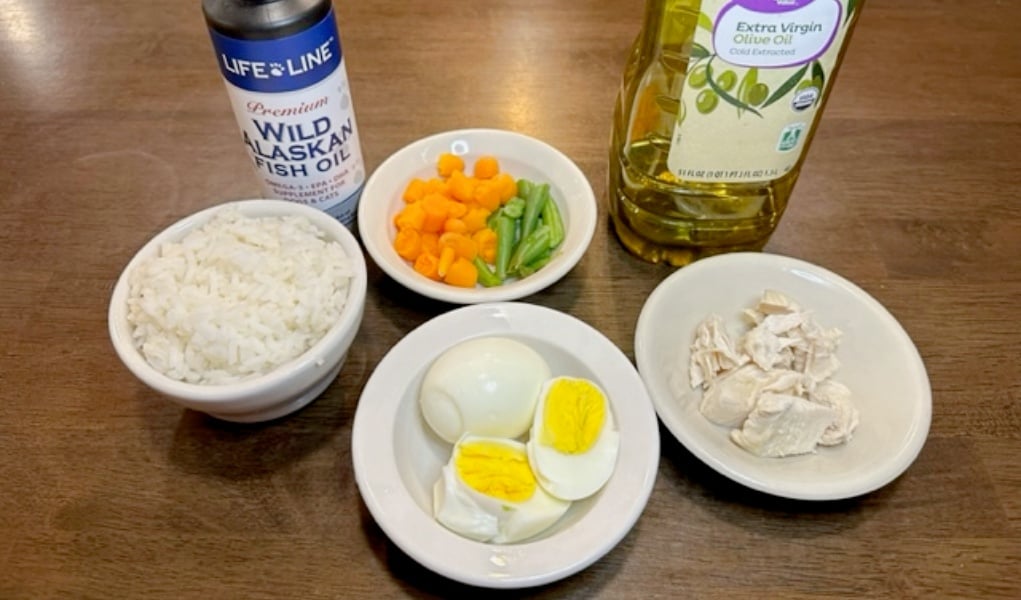If your cat has been diagnosed with kidney disease, you have likely had many conversations with your veterinarian about it. They may have even recommended homemade cat food for kidney disease.
Whether they recommend homemade food or just a change in diet, you have a lot of options. There are many commercial diets for cats with kidney disease, but it's going to be difficult to choose the best option.
There are many stages of kidney disease in cats. Depending on the stage that your cat is in, his nutritional needs will vary greatly. This is why it is so important to discuss a dietary change with your veterinarian or a trained feline nutritionist.
You may not be able to find a commercial diet that meets your cat's specific nutritional needs. It is also common for finicky cats to turn up their nose at commercial food for kidney disease. For whatever reason, it just seems to be less palatable than traditional commercial cat food options.
Homemade recipes are much more tempting for your pet, but you need to be sure you create recipes that will cater to his nutritional needs and his kidney issues. This is why it's so important to consult an expert.
Homemade Cat Food for Kidney Disease Recipe

The kidneys are part of the body's filtration system. They help to process waste and filter it into urine to be excreted by the body.
They also help maintain normal water and salt concentrations. The kidneys aid in controlling blood pressure and calcium metabolism and help sustain phosphorous levels.
Kidney disease can ultimately result in death, and it's something that you need to take extremely seriously. Your vet will work with you to develop a treatment plan, but there is no doubt that diet will be a huge part of that.
Your vet will likely recommend a diet low in phosphorus. They will also discuss the importance of high-quality proteins.
When the feline body digests protein, nitrogen is left behind. The kidneys help to filter out this nitrogen. Higher-quality proteins leave behind less nitrogen as they are digested, so it's important to incorporate them in homemade cat food for kidney disease.
Most people think that pets with kidney disease shouldn't eat protein, but that couldn't be farther from the truth. As the disease progresses, your vet may recommend a smaller percentage of protein, but you should never cut it out completely.
You can print this homemade cat food for kidney disease recipe and share it with your vet. They can help you evaluate the nutritional content to ensure it is going to meet your cat's needs.
They may recommend adding supplements or substituting ingredients in order to meet your cat's unique needs.
PrintRecipe: Homemade Cat Food for Kidney Disease
This homemade cat food for kidney is very easy to make. The ingredients are readily available in most areas, and affordable on any virtually every budget.
- Prep Time: 5 minutes
- Cook Time: 25 minutes
- Total Time: 30 minutes
- Yield: about 4 cups of food 1x
- Category: Cooked Food
- Method: Stovetop
- Cuisine: Cat Food
Ingredients
- 2 tablespoons cooked green beans
- 2 teaspoons cooked carrots
- 2 hard boiled eggs
- 2 tablespoons baked or boiled chicken breasts
- 2⁄3 cup cooked white rice
- 1 tbsp. olive oil
- ½ tsp. fish oil
Instructions
This recipe is simple to make. You will need to cook the chicken, vegetables, eggs and rice before putting all of the ingredients together.
Once you have prepped the ingredients, you'll need to add them all to a food processor. Puree the ingredients until they form a pate consistency.
Nutrition
- Serving Size: 1/4 cup
- Calories: 72
- Sugar: .1 g
- Sodium: 12 mg
- Fat: 3 g
- Carbohydrates: 6.3 g
- Fiber: .1 g
- Protein: 2.7 g
- Cholesterol: 38 mg
How much to feed: I recommend feeding about 1/3-1/2 cup of food daily. This recommendation is for 2 servings per day. However, your veterinarian may recommend splitting your cat's meals into multiple smaller servings depending on the stage of kidney disease that he is in.
This is just a guideline.
Typically, cats do not overeat, but some cats do. Your cat may not overeat dry kibble, but the enticing whole-food ingredients of homemade food may cause him to eat more than he should.
How to store: You can store the leftover cat food for kidney disease in an airtight container in the refrigerator for 3-5 days or freeze it in an airtight container for storage of up to 3 months. Keep in mind that this recipe includes no preservatives, so it won't last nearly as long as commercial cat food.
For More Information
We publish many homemade dog food and treat recipes every month. For more recipes, pet food cooking tips, and advice, see our “Recipes” section. If you're new to the home-cooked pet food subject, I recommend you read more about “How Much To Feed” to understand serving sizes, “What Supplements To Use” to create well-balanced meals, and “How To Store” for tips on simple and easy homemade pet food storing in a fridge or a freezer.












